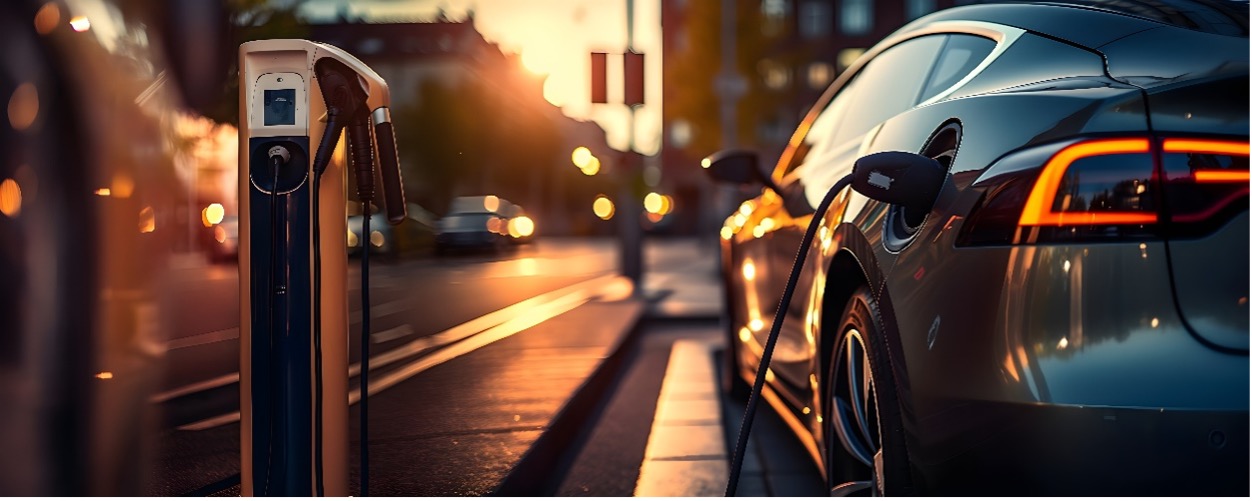The ongoing debate between electric and gasoline cars has been a topic of interest for years, fueled more recently by the rapid increase of electric cars on the road which is piquing many people’s interest and curiosity about these vehicles. Perhaps the most important (but often overlooked) consideration is safety, as the operation of vehicles and the act of driving are already inherently dangerous. When considering a new class of vehicle in the form of electric cars, it is natural and expected to be skeptical of safety.
Safety Benefits of Electric Cars

One prominent advantage of electric cars is their lower center of gravity. Electric cars have their heavy battery packs located at the bottom of the vehicle, which lowers the overall center of gravity. This makes them less prone to rollovers and provides better stability on the road. Studies have shown that electric cars have a significantly lower risk of rollover accidents compared to gasoline cars.
Electric cars also have reduced risk of explosion. Gasoline cars carry highly flammable fuel, which can lead to fires and explosions in the event of a collision. Electric cars, on the other hand, do not carry such fuel and are less likely to catch fire or explode in an accident. This can greatly reduce the risk of injury or death in a crash. In the event of a crash, electric cars have built-in safety features that can help prevent fires. For example, most electric cars have a battery management system that monitors the temperature and voltage of the battery pack. If any abnormalities are detected, the system can shut down the battery to prevent overheating and reduce the risk of fire.
Several studies and statistics support these claims. For example, a study conducted by the National Highway Traffic Safety Administration (NHTSA) found that electric cars have a 40% lower risk of rollover accidents compared to gasoline cars. Another study published in the journal “Injury Prevention” found that electric cars have a 50% lower risk of fire-related deaths compared to gasoline cars.
Comparing Crash Test Ratings
Crash test ratings are an important factor to consider when evaluating the safety of a vehicle. These ratings are based on simulated crash tests conducted by organizations such as the NHTSA and the Insurance Institute for Highway Safety (IIHS). They evaluate how well a vehicle protects its occupants in various crash scenarios.
When comparing crash test ratings between electric and gasoline cars, keep in mind that both types of vehicles can achieve high safety ratings. However, electric cars have been shown to perform comparatively well in crash tests due to their design and construction. As previously mentioned, the lower center of gravity in electric cars provides better stability and reduces the risk of rollovers. Electric cars often also have reinforced structures to protect the battery pack, which can provide additional protection in the event of a crash.
Environmental Impact
The environmental impact of vehicles is another important factor to consider when evaluating their safety. Gasoline cars contribute to air pollution and climate change through the emission of greenhouse gases and other pollutants. These emissions have been shown to contribute to air pollution and have serious health effects on humans, particularly respiratory complications directly related to poor air quality.
Electric cars, on the other hand, produce zero tailpipe emissions. They are powered by electricity, which can be generated from renewable sources such as solar or wind power. By driving an electric car, you can significantly reduce your carbon footprint and contribute to a cleaner, healthier, and breathable environment.
Maintenance and Repair
The maintenance and repair needs of a vehicle can also impact its safety. Electric cars generally require a lower frequency of maintenance and repairs compared to gasoline cars. This is because electric cars have fewer moving parts and do not need regular oil changes or tune-ups. Regenerative braking systems, which reduce wear and tear on the brake pads and extend their lifespan, also reduce maintenance needs. If a car is not properly maintained, it can lead to mechanical failures and increase the risk of accidents. As electric cars have fewer concerns when it comes to maintenance, they are at reduced risk of incidents that often arise in other types of vehicles as a result of missing or postponing routine maintenance.
The Future of Electric Cars
The future of electric cars is rapidly evolving. Advancements in technology, such as improved battery technology and faster charging infrastructure, are making electric cars more practical and accessible for consumers. Changes in consumer behavior, such as increased awareness of environmental issues and a desire for sustainable transportation options, are driving the demand for electric cars.
As electric cars become more mainstream, we can expect to see further improvements in safety and the unique mechanical architecture. Car manufacturers are investing heavily in research and development to enhance the safety features of electric cars, including advancements in autonomous driving technology, collision avoidance systems, and vehicle-to-vehicle communication.
Learn More about Your Options at Car Credit
Come visit Car Credit at any of its four Tampa Bay locations with any of your questions or concerns in hand! Its salespeople will be happy to hear your specific needs and direct you to the vehicle that best suits you and your family. Car Credit will be glad to discuss electric or hybrid vehicle options, and to notify customers of the availability of electric vehicles in its inventory.
Check out Car Credit’s website at carcredittampa.com for a full list of available vehicles and contact information. Car Credit also offers a flexible financing policy, and approves anyone regardless of credit score, whether you’re new to the country, have significant negative history on your credit report, or are a first-time car buyer. With Car Credit you can also breathe easy with 2 years of free maintenance on many of its vehicles!

